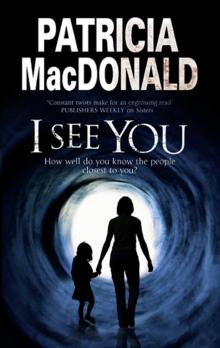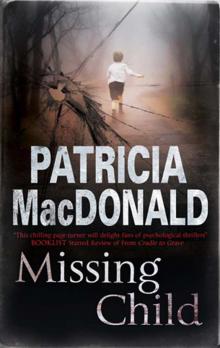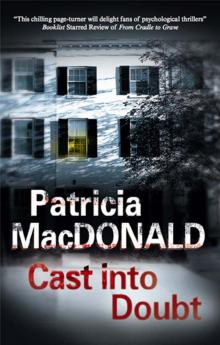- Home
- Patricia MacDonald
Don't Believe a Word Page 12
Don't Believe a Word Read online
Page 12
Eden felt flummoxed. She could not reply for a moment. ‘Well, I don’t know. I mean, under extreme circumstances—’
‘Circumstances! Oh come on,’ Marguerite insisted. ‘I know all about extreme circumstances. But some things are non-negotiable. This is about Tara. Would she? Ever?’
‘How can I answer that?’ Eden cried.
‘You can answer it better than anyone, because she was your mother and she raised you. What is the answer to that question?’
Eden took a deep breath. ‘No,’ she said.
Marguerite nodded and slapped her palm on the table. ‘Exactly.’
THIRTEEN
It was nearly three in the morning when Eden finally fell into a restless sleep.
She had lain awake for hours, suffering from indigestion, but not from the food. She kept thinking of all that Marguerite had said. When finally she slept, she dreamed of Tara, but the dreams were not pleasant. In her nightmares, Tara was weeping, running, trying to protect her child, but the child she was trying to protect was not Jeremy, but Eden. That awoke Eden with a start. It was only six a.m. There was no point to getting up this early. She tried to sleep again, but her racing thoughts would not permit it.
As soon as the hour was acceptable, Eden got out of bed and began to get ready. It didn’t take her long. She couldn’t stomach any breakfast and she didn’t really care much what she wore. All she wanted was to be warm in this city which never seemed to be anything but cold. She drove downtown to the police station and parked her car outside. Even at this early hour in the morning, the police station was abuzz with activity. A bearded black man in shabby clothes and handcuffs was being led into the building, while two lawyers shivering in topcoats conversed, then rushed inside. Eden followed them in, and waited her turn. The lobby was already filled with people looking either angry or afraid. She tried not to meet anyone’s gaze. When her turn came, she approached the desk and cleared her throat.
The desk sergeant looked up at her impassively. ‘Yes?’
‘My name is Eden Radley. Not too long ago, my mother and my half-brother were killed in a carbon monoxide poisoning in their home. I wondered if I might talk to the detectives who worked on that case.’
‘Names?’ he said.
‘I’m sorry. What?’
‘Names of the victims.’
‘Oh. Tara and Jeremy Darby.’
‘And why do you want to see the detective?’
‘I have a lot of questions about the case,’ she said, and then, fearing her request might be denied, she decided to embellish a little bit. ‘I’ve come here from New York City to discuss this.’
‘Do you know the name of the detective who handled the case?’
‘As a matter of fact, I do,’ said Eden, wielding the name she had learned from Tim McNee, the insurance agent. ‘I believe it’s a Detective Burt?’
‘Just a minute.’ The desk sergeant picked up the phone and spoke in a low voice to the person at the other end. He nodded a few times, and then said ‘Okay.’ He hung up the phone and looked up at Eden.
‘Wait here,’ he said. ‘Step back.’
Unsure if that was a yes or a no, Eden did as she was told. In a few minutes, the door from the squad room opened, and a detective appeared. He had gray hair and a sallow complexion. His navy blue suit had dandruff on the shoulders. He looked like he could use a shave.
‘Ms Radley?’ he said politely. ‘Come on in.’
‘Hey, how come she gets to see someone?’ complained a destitute-looking woman whose clothes smelled of urine. No one responded to her question.
Eden followed the detective into the squad room, passing a number of desks with computers and ringing phones, and other officers, plainclothes and uniformed, drinking coffee and getting their day started. Detective Burt directed Eden to a small office, and a vinyl-covered chair, with a seat mended in duct tape.
‘How can I help you?’ he said.
Eden settled into the chair. There was a pile of folders on Burt’s desk, and constant beeping on his phone. A bulletin board behind him had layers of Post-it notes and forms attached to it, as if getting to the bottom of crimes in this precinct was a never-ending task. ‘I … I’m here about my mother, Tara Darby? Do you remember her case?’
Burt nodded. ‘Sure. The carbon monoxide deaths. It wasn’t that long ago,’ he said.
‘I received a visit yesterday from some investigators at her insurance company. They don’t want to pay out on my mother’s policy.’
‘Are you the beneficiary?’ he asked.
‘No,’ said Eden. ‘My stepfather is. They told me that they had received a tip that my mother might not have committed suicide, as it had been reported. That she and my half-brother may have been murdered. They said you received the same information.’
The detective waved a hand dismissively. ‘Gossip and slander is not the same as information. There was really very little question in this case.’ He tapped impatiently on his blotter. ‘I’m sorry, miss, but that’s how it is.’
‘The insurance investigators said,’ Eden persisted, ‘that the police had refused to give them all the documentation about … my mother’s death.’
Burt looked weary. ‘That’s not so. We gave them whatever we had. There are some reports that are not yet completed. The coroner’s office gave us a verbal report, including the results of the toxicology tests. We still haven’t received a hard copy ourselves. There’s a backlog in all our county offices. As for the insurance companies, this is business as usual for them. They are stalling, so they don’t have to pay. Is it a large amount?’
‘Yes,’ said Eden.
‘Well, there you go,’ he said. ‘It was a suicide. Your mother sealed up the house and left a suicide note.’
‘What did it say?’
‘I don’t … honestly remember. That she was sorry. The normal things.’
‘Would you mind looking it up?’ Eden said politely.
The detective sighed, as if her request was a terrible burden. But he did not protest. He turned to his computer and began to tap on it. After a few minutes he said, ‘Here it is. “I am sorry. I can’t go on. Please forgive me.” That’s what it said.’
‘Who was it addressed to?’
‘Her husband,’ said Burt patiently.
‘Handwritten?’
He shook his head. ‘Printed.’
Anyone could have written that, Eden thought. It was completely impersonal. ‘Thank you,’ she said, then took a deep breath. ‘Mr Preston, one of the investigators, said that both my mother and my half-brother were sedated.’
‘That’s true,’ said Burt. ‘We found a bottle of barbiturates. The coroner’s office stated that they both had barbiturates in their systems. I mean, what else would you do but give your child something to make him sleep, so that he wouldn’t suffer? Same thing she did for herself.’
‘How could a small, sick child like that have swallowed a pill?’
Burt shrugged. ‘He couldn’t. There was a feeding tube. She probably crushed it and put it into liquid.’
‘Was the tube tested?’ Eden demanded.
‘Ms Radley,’ he said patiently. ‘He couldn’t have swallowed the pill, but it was in his system. It had to come through the tube.’
‘But an autopsy was done?’
‘Yes, of course,’ said the detective. ‘As I said, we’re still waiting for a copy of their report. But the coroner said that they died of carbon monoxide poisoning. I saw the bodies. Believe me, they did. They were both cherry red in the face.’
Eden felt a little nauseated by this vivid description.
‘I’m sure this is all very difficult for you, but I’m trying to be frank with you.’
‘I appreciate that,’ said Eden.
‘Now is there anything else?’ he asked, rising from his chair.
Eden did not budge. ‘My stepfather, Flynn Darby, is filing suit against the company for refusing to pay. They said that they plan to countersue Mr Dar
by under the slayer rule. They wanted me to join the countersuit.’
‘The slayer rule?’ Burt asked in disbelief. He shook his head. ‘No wonder our insurance premiums are so high. We have to pay for these attorneys to file frivolous lawsuits. My advice to you, Ms Radley, is to keep out of it. This was a straightforward homicide/suicide. Sad and terrible, but there it is. Mr Darby had nothing to do with it. He was at a writers’ convention that was held at …’ Burt hesitated and then tapped on the computer and studied the screen. ‘… the Seagate Convention Center in downtown Toledo. He had a room in a motel right there on Garfield Street, and that is where he spent the night.’
‘Did someone check on that?’ Eden said stubbornly.
‘Of course we checked on it. We spoke to the night clerk at the motel, and to the registrar of the writers’ group. They have him signed in at five o’clock for the evening’s program.’
‘Do you know if he actually attended that program? Did anyone see him there, after he signed in?’
‘He went to the conference with a student intern. A young Muslim woman named Aaliya …’ he squinted at the papers in the folder. ‘Saleh.’
Eden stared at him. ‘They were there together?’
‘Two rooms,’ he said. ‘Different floors.’
‘But he brought her there? Overnight?’ Eden demanded.
‘Yes. I know what you’re thinking, but your mother knew all about it, apparently. We spoke to the girl. She has aspirations to be an author. She’s a student at the college where he teaches. Look, my junior partner spoke to several people, including the Muslim girl’s uncle, who is quite strict. He’s a big mucky-muck at a mosque here in Detroit.’ Burt squinted at the notes on his desk. ‘The Al-Aqsa Mosque. It’s spelled A-Q-S-A, so I don’t know if that’s how you pronounce it.’
Eden made a mental note.
‘Anyway, he had actually given his permission for his niece to go to Toledo with her professor. It was all on the up and up. They attended seminars. People saw them there. I can assure you, that’s where Flynn Darby was on the night that his wife killed herself. He drove this Aaliya home the next morning and went back to his house, expecting to see his family, but when he went in the house, he found them both dead, the suicide note on the table, the doors and windows blocked so that the carbon monoxide could not escape. The house has an attached garage. The garage door was locked from the inside. The connecting door to the main part of the house was open, and the car was completely out of gas. It probably idled in the garage for most of the night. Anyone in the kitchen, dining, living room area could have clearly seen the door open, the car running. They could have turned it off. Your mother could have turned it off. But she didn’t. Mr Darby came in the front door and found his son dead in his bed, his wife in hers. And may I just say, I have seen many people react to the deaths of their loved ones over the years. Mr Darby was in a state of complete shock.’
‘Can I look at the reports myself?’ Eden asked.
‘No,’ said Burt.
‘Why not? They’re about my mother. Why can’t I see them?’
‘Because this isn’t the public library,’ Burt said irritably.
‘The insurance investigators suggested that the police department might be shielding Flynn because his grandfather was a cop,’ Eden said, realizing that this amounted to an accusation. She was risking making Burt angry. She said it anyway. ‘Is that true?’
Burt looked at her with an expression more long-suffering than angry. ‘Is what true? Is it true that his grandfather was a police officer? I don’t know. Maybe he was. But if you’re trying to suggest some Thin Blue Line conspiracy and all of that, you’re overreaching, Ms Radley. I don’t know Mr Darby’s grandfather or anything about him.’
‘He’s retired. He lives in New York state.’
‘So why would we be protecting him here in Ohio?’
Eden felt slightly embarrassed. ‘I don’t know. They suggested it.’
‘Look, Ms Radley. This is a very painful thing. Your mother committed suicide, and took her child with her. There’s nothing more you can do for her. I know that suicide is hard to accept, but you just have to try. People always blame themselves when a loved one commits suicide. And then, because it’s so painful, they try to find somebody else to blame.’
‘I don’t believe that she would do that,’ Eden insisted. ‘Maybe she might have killed herself. But not her child.’
‘No one ever wants to believe it,’ Detective Burt said in exasperation. ‘This was a very sad situation, and I know it’s tempting to wish that it isn’t what it appears to be. But you have to accept it, and move on.’
‘I don’t accept it,’ Eden said, and as she said it, she realized that it was true. ‘I can’t.’
‘Well, that’s your prerogative,’ said the detective, standing up. ‘But this case is closed.’ He looked at Eden with an expression that was unmistakable. It said, Get out of here. Reluctantly, Eden got up from the chair.
FOURTEEN
Eden shivered in her idling rental car, waiting for the heat to kick in, and thinking about what she had heard from Detective Burt. She wished she could believe what the detective had said, that everything was exactly as it appeared to be.
But her conversation with Marguerite still weighed on her. Marguerite’s insistence that Tara would never have killed her son rang utterly true to Eden. And now, there was something else. To the police it meant nothing. But to Eden, it seemed the most important fact of all.
When the detective had been describing what they found at the scene, he said that Jeremy was in his bed, and Tara was in her own bed. Eden allowed herself to think about that time in her life when her mother was the source of so much warmth and tenderness. In particular, she remembered one time, when she had fallen ill. Tara and Hugh had called the doctor, who prescribed medication and told them to watch her. If her fever does not break, the doctor said, take her to the Emergency Room. Hugh had gone out to fill the prescriptions, and Tara had made Eden’s room fresh and comfortable. Eden could still remember that long night, when she thrashed in her bed, suffering from feverish visions. Right beside her, all night long, Tara was there. She stayed in her clothes, in case they had to rush to the hospital. But Tara had lain down in Eden’s narrow bed, her head on an extra pillow, and watched over her daughter. Even in her feverish state, Eden was aware that her mother was beside her, protecting her, unwilling to leave her side, even when Hugh urged her to come to bed and get some sleep.
If Tara had indeed decided to take her son on the ultimate journey with her, and had arranged it so that Jeremy would not live through the night, would she have gone to die in her own bed, and left Jeremy in his? It felt utterly and completely wrong to Eden. If Tara had arranged for Jeremy’s death, there was no way she would have passed that last night in another room, leaving him to a fate of unknown suffering alone. They would have found the child in his mother’s arms. But they did find her in another room. So, Eden realized, with a sickening start, if she had gone to sleep in the other room, the only logical conclusion was that her mother could not have known what was about to befall them.
‘Damn,’ Eden whispered. The police were convinced that Tara had killed herself and her son. So they would have no reason to suspect anyone else. Had they really checked on Flynn’s whereabouts when his wife and son died, or had they simply made a few phone calls, and accepted everything they were told, because it confirmed what they already believed? Eden was no longer willing to accept the official version of events. Starting with Flynn’s alibi.
The heat had begun to warm up the car, and a weak winter sun had turned the morning sky gray and yellow. Eden picked up her phone and googled the driving distance between Cleveland and Toledo. It was less than a two-hour drive. Detective Burt had told her that Flynn stayed in a motel on Garfield Street in the area around the Seagate Convention Center. She remembered that the street was Garfield, because it made her think of that cartoon cat. How many motels could there be? It w
as worth a trip of a few hours to ask her questions in person, she thought, and see if the police version was thorough, or perfunctory.
Now, all she needed was a photo of Flynn to show around the motel and find out if anyone remembered seeing him. She googled Flynn’s name, but there was nothing but a blurry group shot in images. She thought of just asking him, and pretending she needed a photo for the book jacket, but she realized how unconvincing that would sound. They were a long way from a book jacket, and that was the purview of the art department anyway. They would probably arrange for a photo of Flynn to be taken when the time came. Then, she had an idea. She got the number for Gideon Lendl’s agency in New York. The receptionist, who had an English accent and whose name was Rachel, was anxious to please when she learned that Eden was the editor for one of their clients.
‘Would you happen to have a photo of the author which I could use for promotion?’ Eden asked. ‘We plan to have a photo taken of Mr Darby for the book jacket, of course, but right now I’m already getting some requests …’
‘Of course,’ said Rachel eagerly. ‘I can send it to you straight away.’
‘Send it to my phone, would you?’ Eden asked.
‘Right away,’ said Rachel.
In the next minute, the photo came through. It was a medium-distance shot, not a professional job, but it was clear and in focus. There was a brooding, almost insolent expression on Flynn’s face. It would definitely do.
The drive west from Cleveland to Toledo on Route 90 bordered Lake Erie for most of the way, and there was virtually no traffic to slow Eden down. She made it to Toledo in an hour and a half, and got off at a downtown exit for Garfield Street. Her search for the likely motel took very little time, as there was only one that she could find. It was a run-down place called the Stella Motel which looked like it had been erected in the 1950s. The rug in the reception area had once been burnt orange. She could still see that color underneath a chair and an end table. The rest of the carpeting was now brown and flattened with age. The desk was a huge, curved blond wood, now dirty blond, counter that may have looked rather space age when the rug was still burnt orange. But now everything about the place looked worn out.

 I SEE YOU an unputdownable psychological thriller with a breathtaking twist
I SEE YOU an unputdownable psychological thriller with a breathtaking twist Sisters
Sisters Don't Believe a Word
Don't Believe a Word The Girl in the Woods
The Girl in the Woods Not Guilty
Not Guilty I See You
I See You Missing Child
Missing Child Cast into Doubt
Cast into Doubt